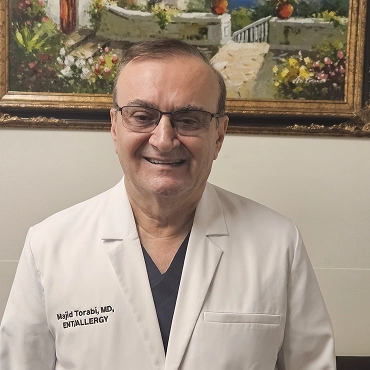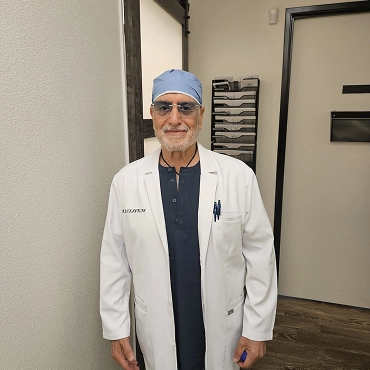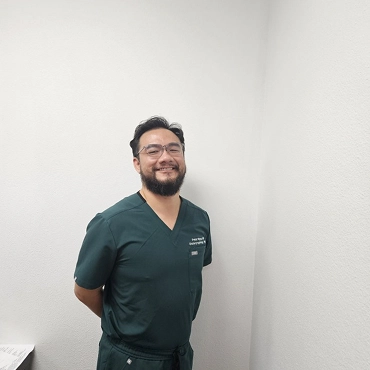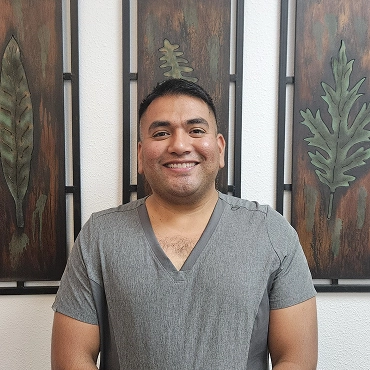“I just met Dr. Ryan Salvador for a first allergy consult at Desert Cities Allergy & Otolaryngology. Dr. Salvador was so terrific I just couldn’t wait to write a review.”
Epistaxis
At Desert Cities Allergy & Otolaryngology, we help patients who experience frequent or severe nosebleeds, also known as epistaxis. Whether caused by dry air, allergies, or an underlying medical condition, our ENT specialists offer advanced care to stop bleeding, treat the root cause, and prevent it from returning.
What Is Epistaxis?
Epistaxis, or nosebleeds, can happen to anyone. They are more common in children and older adults. Many things can cause them—dry air, allergies, colds, or nose picking. Some people get nosebleeds because of medications like blood thinners or health conditions that affect blood clotting.
Most nosebleeds are mild and stop on their own. These are called anterior nosebleeds. But some can be heavy or come from deeper in the nose—these are posterior nosebleeds and may need urgent care.
At our ENT and allergy clinic, we help find the cause of frequent nosebleeds. Our team can create a treatment plan that fits your needs.

Types of Epistaxis
There are two types of epistaxis:
Anterior nosebleeds are the most common type and usually come from the front part of the nose, where many tiny blood vessels are located. These are often triggered by dry air, nose picking, or minor trauma. They are generally easy to manage at home and rarely require medical intervention.
Posterior nosebleeds are less common but can be more serious. They originate deeper in the nasal cavity and may result in heavier bleeding that flows down the throat. These nosebleeds often require medical treatment and can be linked to high blood pressure, trauma, or other underlying health conditions.


Common Triggers of Nosebleeds
Nosebleeds can occur for many reasons. Some of the most common include:
- Dry indoor air or changes in weather – Dry or cold air can dry out nasal tissues, making them more prone to bleeding.
- Frequent nose blowing from colds or allergies – Constant blowing irritates and weakens the nasal lining, leading to nosebleeds.
- Nasal trauma or injury – Any bump, scratch, or direct hit to the nose can damage blood vessels and cause bleeding.
- Use of blood thinners or other medications – Medications like aspirin or anticoagulants reduce clotting, making bleeding more likely.
- Chronic sinus infections – Ongoing inflammation from infections can irritate nasal tissues and increase the risk of bleeding.
- Allergic rhinitis (hay fever) – Allergies cause nasal congestion and itching, which can lead to frequent rubbing or blowing.
- Deviated septum or other nasal abnormalities – Structural issues can disrupt airflow and dry out the nose, raising the chance of nosebleeds.
If you experience regular nosebleeds or bleeding that doesn’t stop within 20 minutes, it’s time to consult an ENT specialist.


When Allergies Lead to Nosebleeds
Allergies often cause nasal inflammation and frequent sneezing or rubbing of the nose. Over time, this irritation can lead to cracked blood vessels and bleeding. At our ENT and allergy clinic, we offer comprehensive allergy testing to identify environmental allergens like pollen, mold, or pet dander that may be contributing to your symptoms.
By addressing both allergies and nasal dryness or inflammation, we can reduce your risk of future epistaxis episodes.
How We Diagnose & Treat Epistaxis
Our experienced ENT specialists use a detailed and patient-first approach. During your visit, we’ll review your health history and perform a nasal examination to locate the source of bleeding. Diagnostic tools such as nasal endoscopy may be used if bleeding is recurrent or difficult to trace.
Treatment options may include:
- Nasal moisturizing sprays or ointments
- Cauterization of bleeding vessels
- Nasal packing or balloon devices for more severe bleeds
- Adjustments to medication, if blood thinners are involved
- Allergy management and nasal irrigation
- Surgery for structural issues (e.g., deviated septum)


Why Choose Desert Cities Allergies & Otolaryngology for Nosebleed Care?
- Comprehensive ENT and allergy care: We treat a wide range of ear, nose, and throat issues, including allergy-related conditions. Our goal is to provide relief while addressing the root cause for lasting results.
- Expert care for chronic nasal problems: Our board-certified ENT specialists are highly experienced in managing chronic nosebleeds and other nasal conditions with precision and care.
- Quick, effective in-office treatments: We offer minimally invasive procedures right in our clinic. These treatments provide fast relief with little downtime, helping you get back to your routine quickly.
- Personalized treatment plans We consider your health, lifestyle, and goals when creating your care plan. This approach ensures better results and long-term comfort.
Personalized Care From Trusted ENT Doctors
At Desert Cities Allergy & Otolaryngology, our board-certified ENT doctors offer expert care backed by years of experience. Whether your epistaxis is minor or ongoing, we work closely with you to build a customized treatment plan that addresses your symptoms and prevents recurrence.
We don’t just treat nosebleeds—we look for the “why” behind them.
Don’t Ignore Frequent Nosebleeds
Even occasional nosebleeds can be a sign of something more. If you’re experiencing frequent or unexplained bleeding, contact us for a full evaluation. We’re here to help you breathe easier, feel better, and stop worrying about when the next nosebleed will strike.

what our patients say about us
P
Pat G
S
Sonia O
“This is by far the best doctor I’ve ever had! Dr. Ryan Salvador is great at explaining everything he’s doing and what is going on! Thank you !!!”
S
Self-verified patient
“Dr. Torabi takes care of my son and he does a very good job.”
A
Amanda
“Amazing staff and doctor, fixed all my problems. Thanks doc i can breath!”
M
M Nichols
“My family is extremely grateful for the care by Dr Torabi and his staff in helping us beat cancer.”
Choose your preferred location


Schedule Your Visit Today
Find out what’s causing your nosebleeds and get lasting relief. Book an appointment at Desert Cities Allergy & Otolaryngology today and take the first step toward clearer, healthier breathing.





